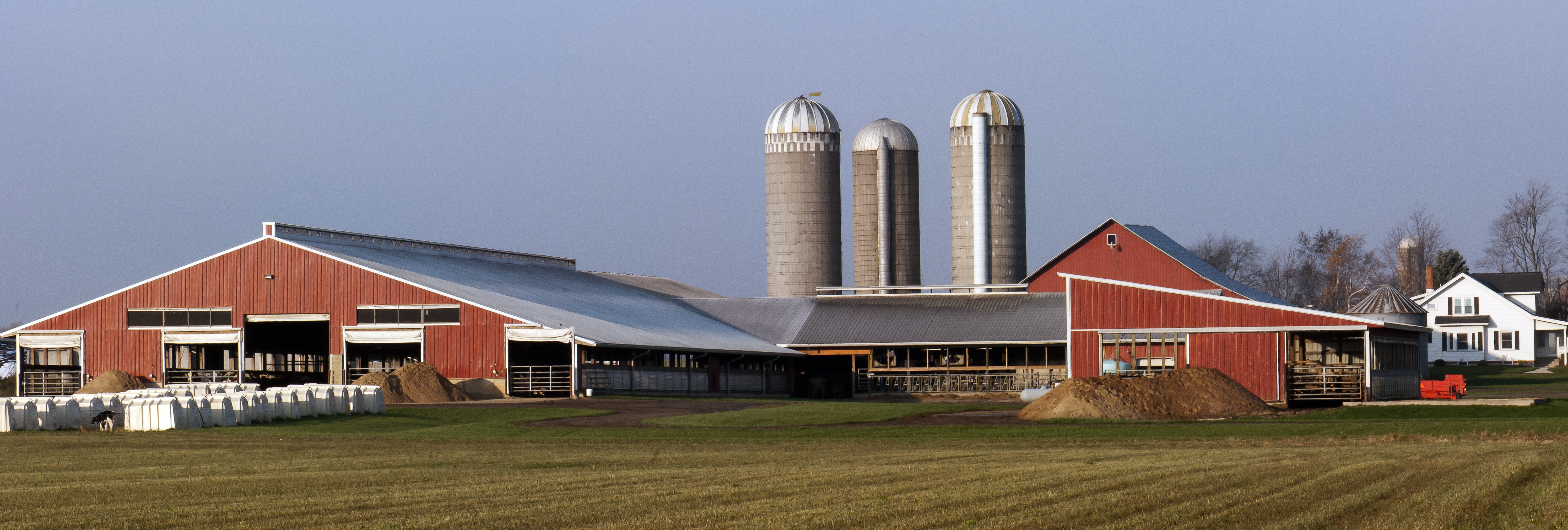Section 3 | Reduction
Page 07 /
Improving Biosecurity on the Farm
Reduction
When looking for ways to reduce the use of antimicrobials on the farm, you will see the biggest impact if you focus on disease prevention. Keeping animals healthy is a great way to reduce the need for antimicrobials. Putting an emphasis on biosecurity and animal husbandry can lead to a reduction in antimicrobial use.
Biosecurity
What is Biosecurity?
Biosecurity is the use of procedures or practices to protect livestock against harmful pathogens that are able to cause disease. Biosecurity principles can be used to prevent disease from entering a farm or prevent the spread of disease within a farm.
Why is Biosecurity Important?
Disease entry onto a farm can cause a significant number of consequences including:
- Reduction in productivity and profitability
- Poor animal welfare
- Increased labor and veterinary costs
- Closure of export markets
- Negative impacts on human and environmental health
Implementing biosecurity can aid in preventing disease entry or spread to minimize these risks. A biosecurity program requires an understanding of where disease could enter or spread, and making changes in management or planning to prevent their entry or spread. In many cases, these changes do not require a large financial investment.
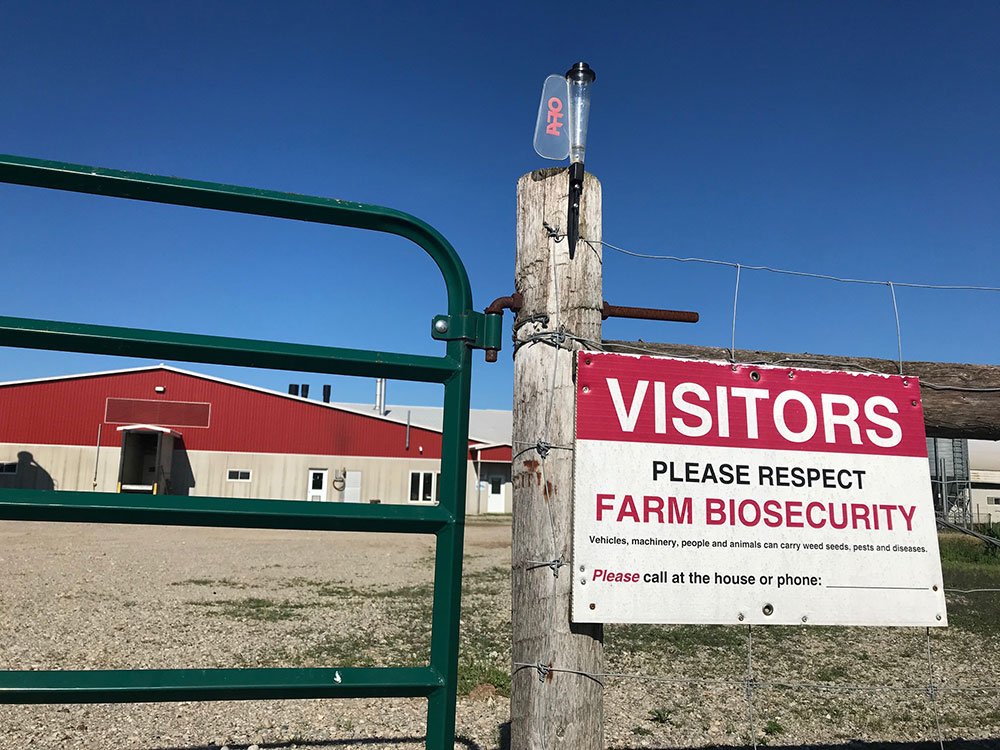
Critical Control Areas for Biosecurity
There are several critical areas that require focus and attention when implementing a successful biosecurity program, namely:
1. Farm Entry
Anything that moves onto a farm is a risk for entry of a disease-causing pathogen. If a disease is not already present on the farm, it could result in a large outbreak. Thus, preventing disease from entering the farm can go a long way towards maintaining healthy animals.
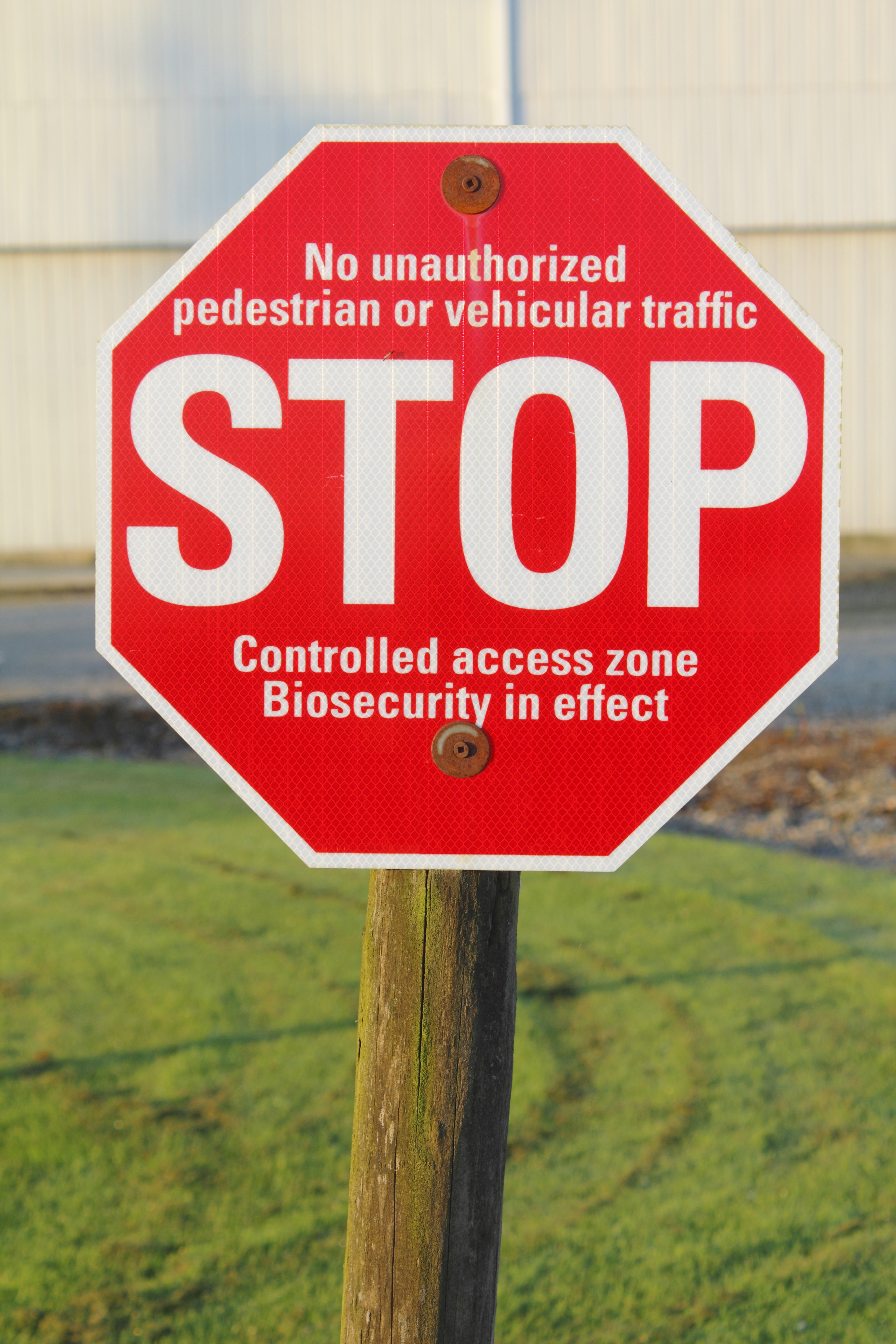
Feed
- Introduction of contaminated feed can lead to disease spreading quickly throughout the farm. Stored feed can also become contaminated with manure from the animals on the farm, or wild animals that have access to the feed
- Some ways to minimize the risk of disease transmission from feed include:
- Cleaning and disinfecting storage bins between feed delivery
- Ensuring feed is stored in an area with minimal contamination of manure and urine
- Implementing measures to reduce wildlife access to stored feed
- Keep feed stored in a way to reduce it from becoming spoiled
- Purchase feed from reputable sources that have a program in place to minimize the risk of pathogen introduction
Water
- Water is an essential component of all livestock management and can become contaminated with pathogens that can cause a variety of diseases. Having clean water is extremely important
- Some biosecurity principles for water include:
- Minimizing contamination of water with manure
- Preventing entry of feral animals into the water source
- Inspecting, maintaining, and cleaning the water system regularly
- Testing water regularly for bacterial contamination
Animal entry
- The introduction of new animals onto a farm poses the greatest threat for disease transmission onto the farm. Some animals that are carrying disease, or have recently recovered from disease, can look healthy but be the source of entry and transmission. To prevent animals from bringing disease onto farms, it is important to:
- Limit the purchase of new animals into the herd or flock
- If animals need to be purchased, test animals for disease prior to purchase, or purchase animals from a reputable source that has a known disease-negative status
- Work with a transporter that properly cleans and disinfects their trailer between loads
- Ensure animals are not showing signs of disease when they arrive on the farm
- Isolate newly purchased animals or returning animals to allow for any signs of disease to appear
- Work with a veterinarian to determine the appropriate period for isolation
- Establish a separate isolation area that is cleaned and disinfected after each isolation period is complete
2. People, Equipment, and Vehicles
People, equipment, and vehicles can move from many different farms or many different locations within your farm. In order to prevent the spread of disease, having an SOP in place to manage the movement of people, equipment, and vehicles will help to contain and prevent disease.
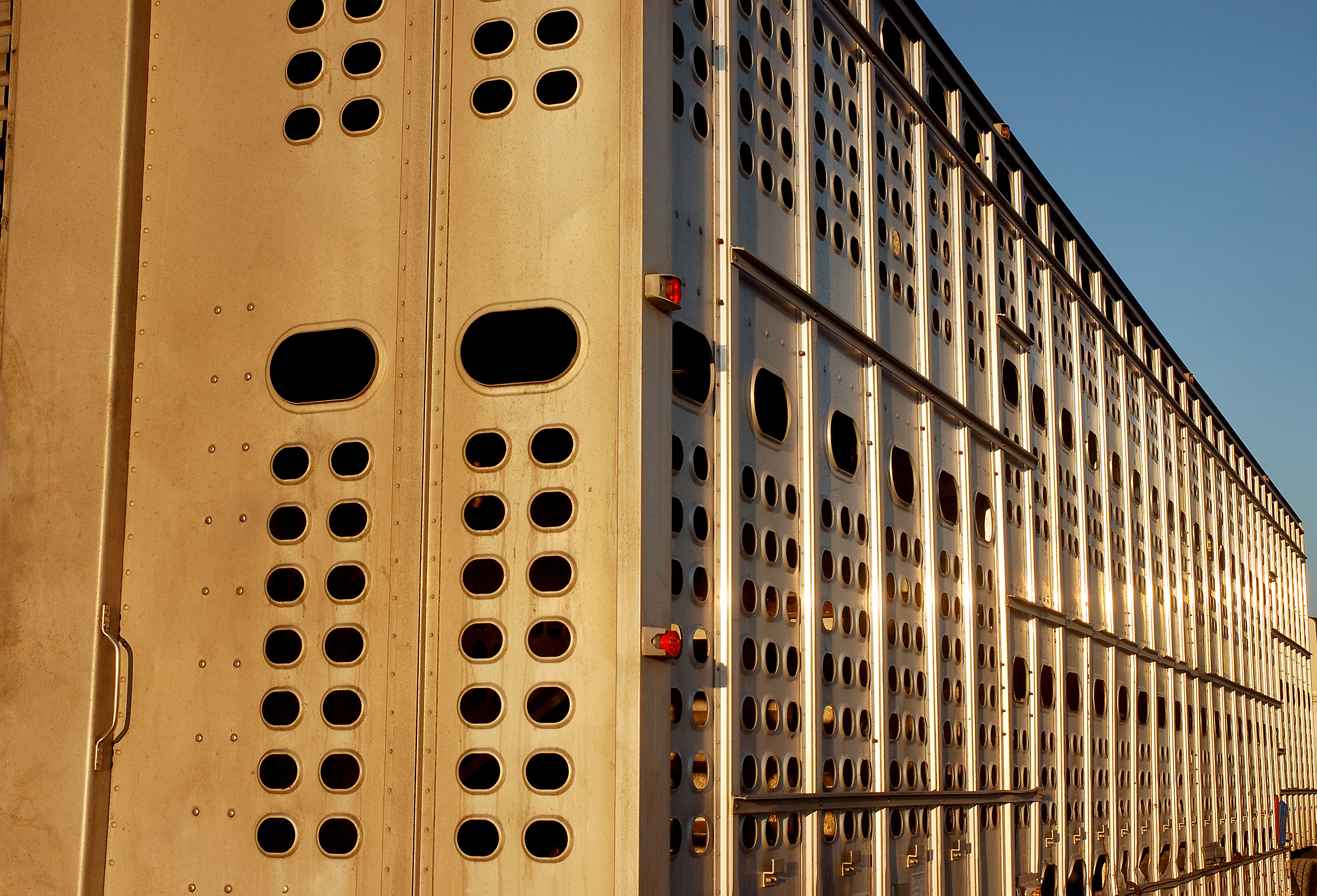
Read More
3. Production Practices
Implementing biosecurity practices into everyday farm management can reduce the risk of spreading disease on your farm.

Livestock management
- Process or work with younger animals before moving to older animals and house them separately
- Young animals are most susceptible to becoming infected with disease and older animals are most likely to harbor disease-causing pathogens
- Clean and sanitize feed troughs and water bowls
- Establish protocols with your veterinarian on how to manage sick animals on the farm
- Establish separate pens for sick animals, maternity pens, and newly arrived animals
- If appropriate, use ‘all-in and all-out’ management
- Ensure routine evaluation of livestock to detect disease early
- Early detection of disease will allow therapy to have greater success and can help prevent the spread of disease through the isolation of the sick animal
- Record disease treatment and mortalities to identify when an outbreak of disease is occurring
- Do not reuse single-use syringes or needles
- Blood remaining on used syringes and needles can transmit disease
- Implement a herd health program with your veterinarian, including a vaccination strategy, parasite management program, and protocols for treatment of disease
- Routinely clean clothing that is in contact with livestock using detergent, ensuring clothes are completely dry
- Routinely clean footwear in contact with livestock using a disinfectant
- Properly dispose of deadstock in a timely manner
Manure management
- Manure from livestock is capable of harboring and spreading disease-causing pathogens. Thus, having a plan in place to reduce animal contact with manure is an integral part of biosecurity:
- Designate equipment that is for manure handling only
- Clean feeders and water bowls that are contaminated with manure
- Ask neighbouring farms not to spread manure close to your barns, production areas, or water sources
- Store manure in an area that is not accessible to livestock, wildlife, and/or pets
- Ensure that manure storage and handling is done in a manner that prevents leaching and spillage
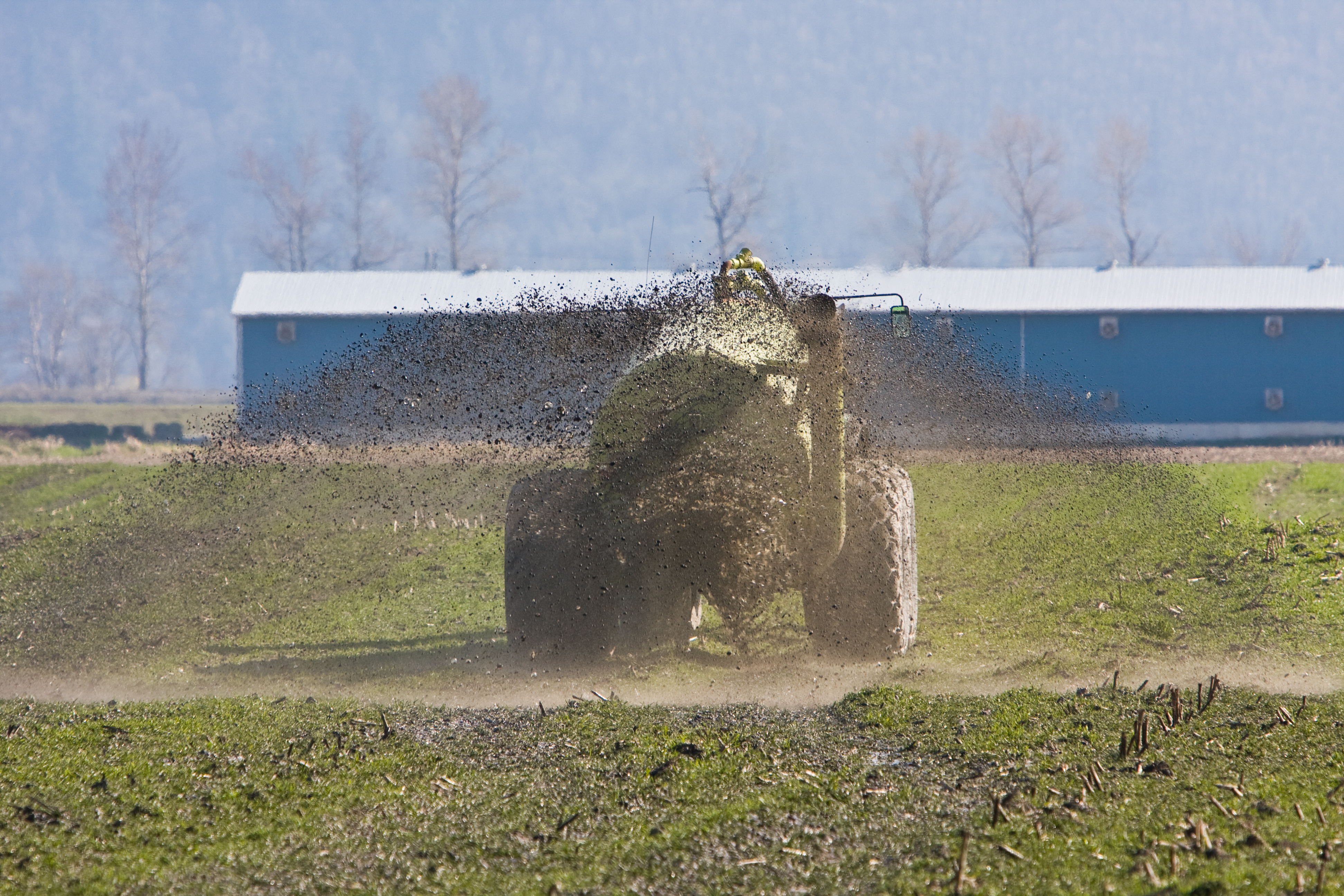
4. Feral Animals and Wildlife
Feral animals and wildlife can harbour harmful diseases. Preventing their access to your animals’ feed and water storage areas can help to prevent disease.
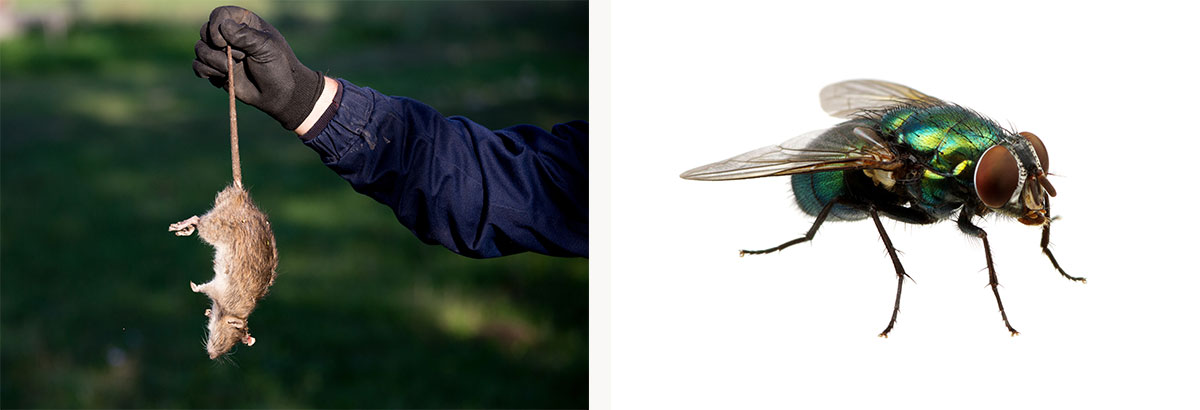
To prevent feral animals and wildlife from transmitting disease to your animals, consider:
- Setting up a rodent control program:
- Maintain bait stations
- Clean up spilled feed
- Maintain a 2-5 foot apron of crushed stone or gravel around the barn and ensure it is free of debris and vegetation
- Minimize the entry of birds into your barn by sealing openings in naturally ventilated barns and exhausts
- Protect feed and water sources
- Dispose of any carcasses promptly and properly
- Control fly/insect population by removing manure, and using traps, baits, and insecticides
5. Farm Exit
To ensure diseases are not going to be transmitted from your farm to others, implementing a biosecurity plan that includes the exit from the farm will help to contain diseases.
Some biosecurity practices that could be implemented include:
- Ensuring laneways used for visitor, delivery, or service vehicles are kept clean of manure
- Providing a disposal container for dirty coveralls and other disposable items. This will also prevent visitors from bringing potentially infectious items to other farms
- Providing documentation of disease status to those purchasing animals from your farm
- Transporting animals that are healthy and not showing any signs of illness
- Spreading manure in areas that will not impact the health status of neighbouring farms
